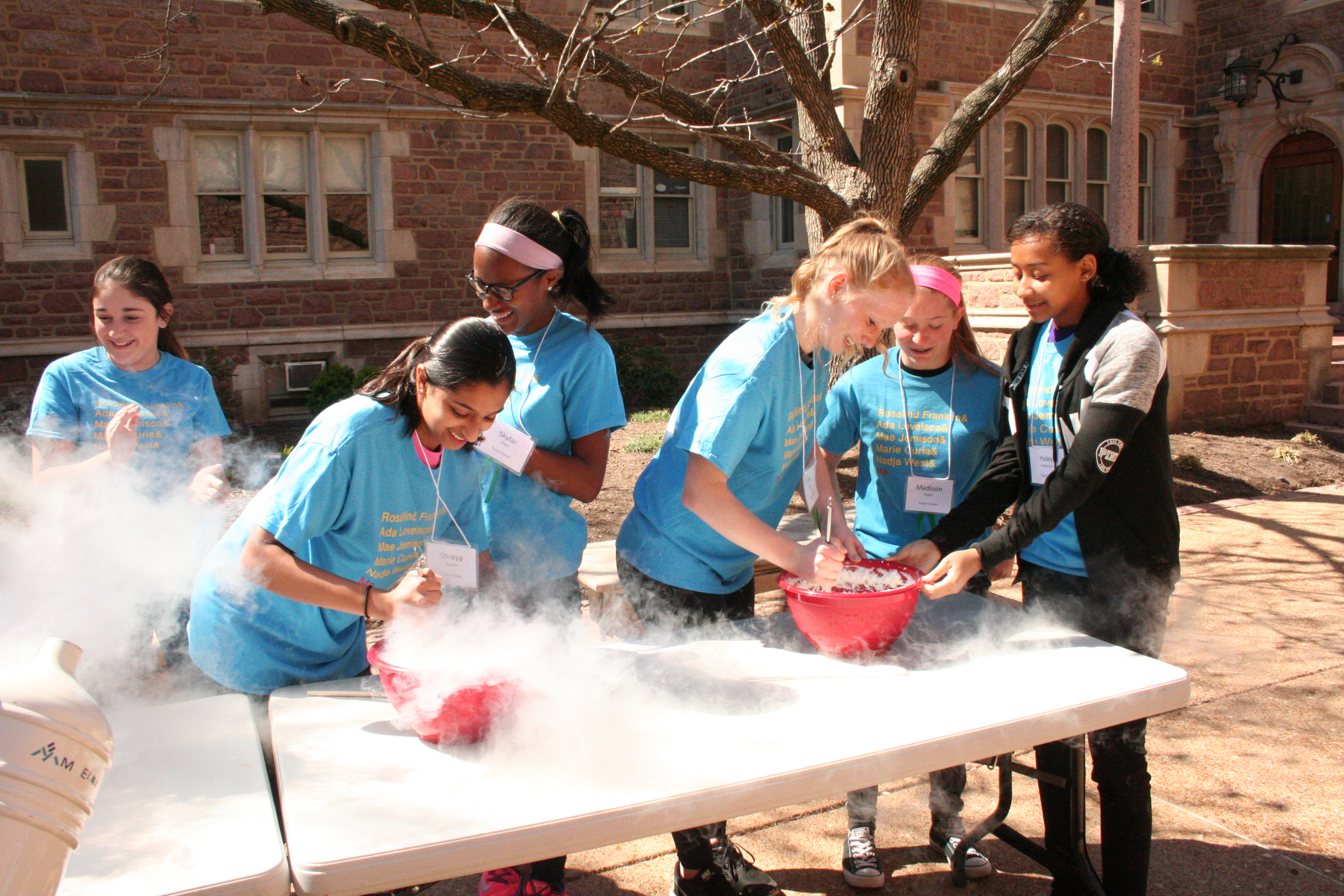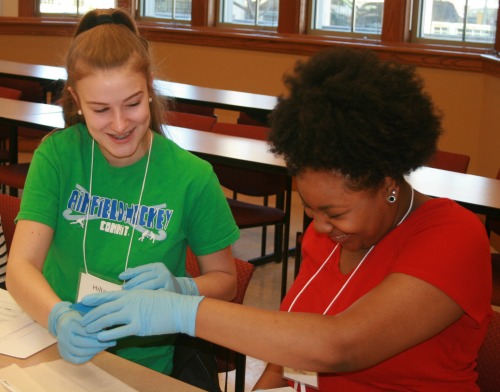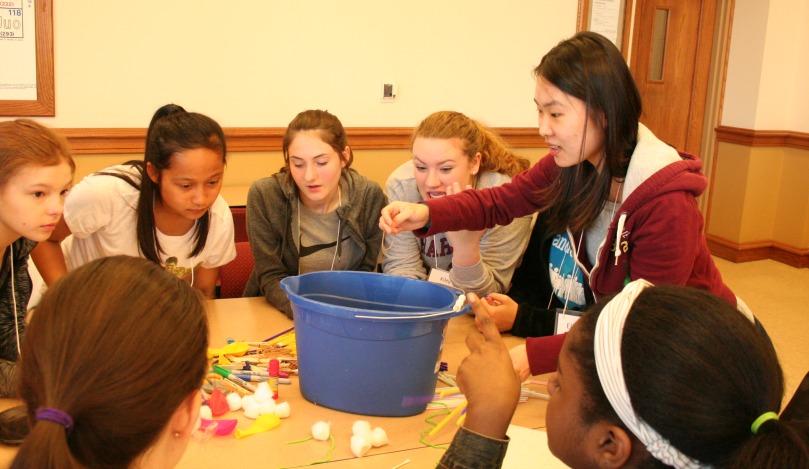Catalysts For Change Turns Six Years (And Going Strong)
“Catalysts for Change” just passed its sixth year of providing exciting STEM programming for St. Louis-area girls. The idea for “Catalysts” was sparked students in the “Women in Science” Focus course. Together with Gina Frey (Florence E. Moog Professor of STEM Education, Chemistry Department) and Barbara Baumgartner (Senior Lecturer, Women, Gender, & Sexuality Studies), who were co-instructors of the “Women in Science,” program, the “Catalysts” program was launched in 2011 with initial support from Campus Action Grant from the American Association of University Women (AAUW). Since then, on two Saturdays each April, this outreach program gives 9th grade girls from around the region a chance to immerse themselves in exploring science.
Catalysts’ three-tiered mentoring structure offers undergraduate women a chance to learn from the female Chemistry Department graduate students who drive the program, while helping younger girls connect with college and grow in confidence in the STEM fields.
The team of graduate students develop the schedule and create the science activities that they then teach. Undergraduate women, drawn to the program through the popular “Women in Science,” course co-taught by Barbara Baumgartner (Women, Gender, and Sexuality Studies) and Gina Frey (Chemistry) serve as team-leaders, who mentor the girls throughout the day. The day is also supported by the presence of volunteers, including Chemistry department lecturers and Washington University Women’s Society members.
 Each Saturday includes six fun experiments, ranging from egg-launches to squid dissection to liquid nitrogen ice-cream-making, as well as guest-speakers who visit during the lunch hour to share their insights as women working in the STEM professions. This year’s distinguishing features included the addition of a new experiment in which the girls created electric buzzer circuits, and, according to longtime participants, the best batch of liquid nitrogen ice-cream yet!
Each Saturday includes six fun experiments, ranging from egg-launches to squid dissection to liquid nitrogen ice-cream-making, as well as guest-speakers who visit during the lunch hour to share their insights as women working in the STEM professions. This year’s distinguishing features included the addition of a new experiment in which the girls created electric buzzer circuits, and, according to longtime participants, the best batch of liquid nitrogen ice-cream yet!
Gaby Szteinberg (Chemistry) who volunteered both days, remarked on the warmth of the event: “It’s like a chain of mentoring, the way that we have so many people from across various departments and offices at the University.”
Michelle Recto (graduating 2016) has been involved in Catalysts for throughout the duration of her time at WashU. As a freshman, she enrolled in the FOCUS: “Women in Science” course and volunteering with Catalysts was a requirement. However, she enjoyed it so much that she decided to volunteer again as a team leader in her sophomore year and then eventually began to serve as the undergraduate student organizer in her junior and senior years.
Reflecting on her experience, Michelle says, “The most rewarding aspect of Catalysts for Change, for me at least, is having the ability to expose these young, impressionable high-school girls to the wonder that is STEM and have them participate in science experiments that they may not have otherwise ever gotten the opportunity to do. STEM has for far too long been considered a ‘boy’s only club,’ and I think it’s incredibly important to educate these girls and let them know that it most definitely is not; they can achieve just as much as their male classmates can, if not more.” (Congratulations to Michelle who is heading to Johns Hopkins University School of Medicine this fall, where she says that she hopes to get involved in a program similar to Catalysts.)
 Catalyst’s success this year stems from the passionate leadership of Chemistry Department graduate students (Tabbetha Bohac, Gina Tran, Emily Reeves, Sofia Smith, Calynn Morrison, Kendra White, Liz Llufrio) and post-docs (Susan Gelman, Chemistry; Priscilla Hwang, Biomedical Engineering; and Rachel Reid, Anthropology); undergraduate team leaders coordinators (Mitra Maz, Michelle Recto, Connie Gan, Sidney Levingston, and Olivia Beres) and their amazing teams of undergraduates); General Chemistry lecturers (Megan Daschbach, Jia Luo, and Gaby Szteinberg); Gina Frey (Florence E. Moog Professor of STEM Education, Chemistry Department) Barbara Baumgartner (Senior Lecturer, Women, Gender, & Sexuality Studies–and a great photographer); and Denise Leonard (The Teaching Center).
Catalyst’s success this year stems from the passionate leadership of Chemistry Department graduate students (Tabbetha Bohac, Gina Tran, Emily Reeves, Sofia Smith, Calynn Morrison, Kendra White, Liz Llufrio) and post-docs (Susan Gelman, Chemistry; Priscilla Hwang, Biomedical Engineering; and Rachel Reid, Anthropology); undergraduate team leaders coordinators (Mitra Maz, Michelle Recto, Connie Gan, Sidney Levingston, and Olivia Beres) and their amazing teams of undergraduates); General Chemistry lecturers (Megan Daschbach, Jia Luo, and Gaby Szteinberg); Gina Frey (Florence E. Moog Professor of STEM Education, Chemistry Department) Barbara Baumgartner (Senior Lecturer, Women, Gender, & Sexuality Studies–and a great photographer); and Denise Leonard (The Teaching Center).
Catalysts is not only supported by a grant from The Washington University Women’s Society, but is powered in part by Women’s Society volunteers, including Andrea Stewart-Douglas (Student Financial Services) and Judy Joerding (Department of Education). A big thanks to these women for their support not only this year, but in previous years.
And with many thanks to Mary Stewart, whose hard work coordinating the weekends’ moving parts makes Catalysts run smoothly every year!
The 2016 Catalysts for Change was funded by The Department of Chemistry and The Teaching Center, with grants from The Women’s Society and The Gephardt Institute.

